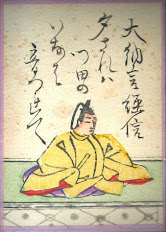Poem Meaning and Background
 |
| Depiction of the poem by the artist Hokusai |
ゆふされば・かどたのいなば・おとづれて
yuu sareba・kadota no inaba・otozurete
あしのまろやに・あきかぜぞふく
ashi no maroya ni・akikaze zo fuku
〜大納言経信(Dainagon Tsunenobu)
Translation
When the evening comes,
From the rice leaves at my gate,
Gentle knocks are heard,
And, into my round rush-hut,
Enters autumn's roaming breeze.
Meaning
This poem was written for a poetry contest (歌会, utakai) that took place at a mountain villa in Kyoto. The topic selected for this author/poem was 「田園の家の秋風」(den'en no ie no akikaze), in English, roughly, "fall wind outside a rural home". The author of this poem beautifully illustrates a typical fall scene: in the evening, the fall wind passes through the rice fields, rustling the rice plants as it breezes in to a hut made of reeds. The poem effectively conveys a pleasant and relaxing fall evening. As opposed to the previous poem ([70] Sa), the author does not instill the poem with any emotions, but merely tries to capture the scenery as it is. Such poems can be categorized as 叙景歌(jokeika), "scenery poems".
The word 訪れて(otozurete) in modern-day Japanese usually means "to visit someone" but in this context (and time period), おとづれて means "to make a sound". The hut is described by the author as 葦のまろや (ashi no maroya), essentially a plain hut covered in reeds.

Comments
Post a Comment